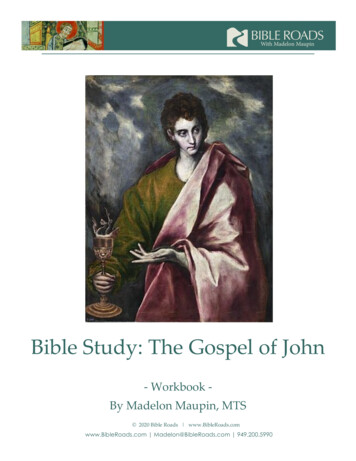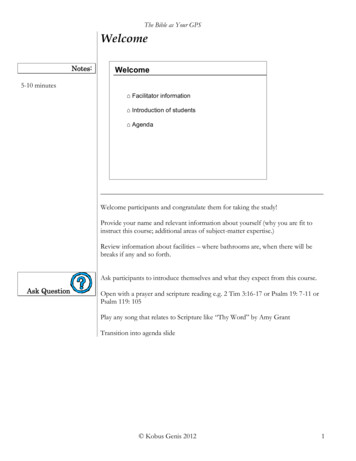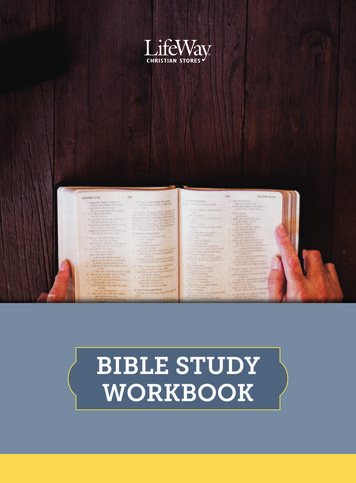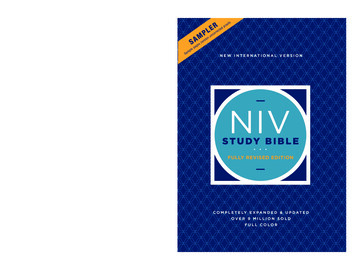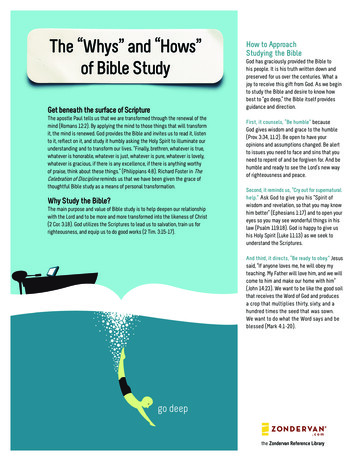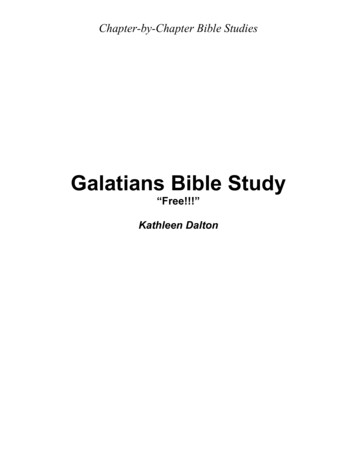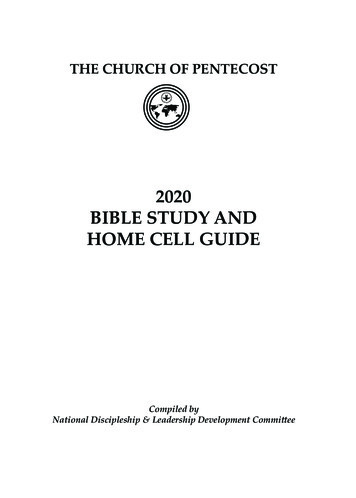
Transcription
THE CHURCH OF PENTECOST2020BIBLE STUDY ANDHOME CELL GUIDECompiled byNational Discipleship & Leadership Development Committee1
All Rights ReservedBible Study and Home Cell GuideCopyright 2020by The Church of PentecostPrinted in Ghana byPentecost Press LimitedP. O. Box DC 803,Dansoman-Accra2
TABLE OF CONTENTS1. Foreword42. Introduction and Acknowledgment73. Bible Study Week by Week Guide144. Bible Study (Scripts)165. Home Cell Week by Week Guide1196. Home Cell (Scripts)1217. Extra Scripts1888. Rule of Conduct for church members2089. Read through the Bible in a Year21110. Feedback Sheet2143
FOREWORDThe overarching theme for the Five-Year Vision of TheChurch of Pentecost (2018-2023) is, ‘Possessing theNations: Equipping the Church to Transform EverySphere of Society with Kingdom Values and Principles.’Further to this, it has pleased the Lord and us to carvefor this year, 2020, the sub-theme, ‘A Glorious Churchto possess the Nations’ (Eph. 3:21; 5:27).The church is likened to the bride of Christ. Christ soloved the church that he gave his life for the church.Through the power of the Word, Christ washes thechurch of every spot, wrinkle or any other blemish. Hisgoal is to present to himself a glorious church whichis flawless, holy and perfect. Thus, a glorious churchis one in which people from all walks of life, cultures,colours, and nations have accepted Jesus as Saviour andin loving obedience submitted to His Lordship.These people have their lives transformed to reflect thatof Christ. These transformed persons become vessels ofChrist to transform every sphere of society. In 2020, ourgoal as a church is to claim our victory in Christ suchthat each member will through a holy and blamelesslife radiate the glory of Christ in every sphere of life.It is this church that can possess the nations, shiningforth as light in every dark arena of life. Through theavenues of teaching, preaching and Bible Study in allour churches, we will be able to engage the Word of Godto know who we are and have become in Christ Jesus.4
The National Discipleship and Leadership DevelopmentCommittee (NDLDC), over the years has beeninstrumental in creating the platform for the entireChurch to engage with the Word of God. In line withpractice, the NDLDC has come up with a material thatblends the Word of God, the theme for the year andselected contemporary issues that require our attentionand action. In this study guide, you will find selectedstudies on the thematic area of the Five-Year Vision andthe theme for this year. These have been simplified ina systematic yet comprehensive way to solicit practicalresponses from all Christians. The Bible Study or HomeCell groups will continue to serve as the focal pointsfor effective engagement.The inductive approach to the discussions, as usual, isintended to engage members for reflection and create anatmosphere of lively discussions and mutual exchangeof ideas. Such healthy exchange of ideas culminatesinto a significant mass to release a glorious church topossess the nations. It is essential that no one sits onthe pane. Get involved and get counted; share yourthoughts guided by Scripture. The story you shareduring discussions will give hope to someone in thegroup. In the same vein, your thoughtful questionscould also be the key to open doors of strongholds inthe minds of fellow believers, and others who may visitthe Bible Study or Home Cell groups.5
This manual, in sincerity, provides an important avenueto be intentional in equipping the members and leadersof the Church for a glorious presence in nationaltransformation with Kingdom values and principles.The NDLDC is once again, highly commended forthe painstaking and meticulous efforts expended inproducing this study manual.I pray that the glory of Christ will reflect on us to beHis glorious Church, equipped to transform lives aswe yearn to possess the nations with Kingdom valuesand principles.God bless you,Eric Kwabena Nyamekye (Apostle)Chairman, The Church of Pentecost6
INTRODUCTION AND ACKNOWLEDGEMENTA Glorious Church to Possess the Nations (Eph.3:21; 5:27) is the theme chosen by the Chairman andthe Executive Council for the year, 2020. This themeushers The Church of Pentecost into the next phase ofits Five-Year Vision which is, ‘Possessing the Nations:Equipping the Church to Transform Every Sphere ofSociety with Kingdom Values and Principles’.As the annual practice is, the National Discipleshipand Leadership Development Committee (NDLDC)has come out with a systematic study on the themefor discussion in small relational groups. To this endthe Bible Study and Home Cell Ministry which is theChurch’s structure for discipleship and pastoral care(under the NDLDC), will facilitate the discussion. Inline with the vision and church practice, some thematicscripts have been developed in this year’s studyoutlines to handle some key aspects of our doctrineand practices as a Church. These thematic scripts areexplained below:The theme for this year gives the Church a clarion callto portray a glorious outlook as we stand out to makea difference. As a result, we will be transforming everysphere of society with Kingdom Values. This calls forthe crucial task of revisiting, revising, reaffirming andreinforcing what we believe, why we believe whatwe believe and how to demonstrate what we believe.7
This has become imperative due to the contemporarypluralistic world where anything is accepted andthe gap between the Kingdom of God and darknessis gradually being bridged. In response, aspects ofpractical Christian life, beginning from the home,through the streets to the marketplace have beenhighlighted in our studies for this year. The intent is toengage our attention, reflection and action.The topics include: Uphold Truth in the Streets, Holy Vesselsfor Honourable Use, Mentoring the Youth, Family Commitmentto Biblical Values, Unity in the Body of Christ, Bad CompanyCorrupts Good Character, Don’t Compromise your ChristianValues, Truly Acknowledging Christ’s Lordship, among others.It is expected that sincere attention will be given to thispractical Christian lifestyle issues to reflect the gloriousnature of the Church in society as stated in Ephesians 5:27:He did this to present her to himself as a glorious churchwithout a spot or wrinkle or any other blemish. Instead,she will be holy and without fault (NLT).As with previous years, a contemporary issue will bediscussed. We shall continue with the issue of caring forthe environment in recognition that it is the handiworkof God, our Father. This year, the focus is to bringstakeholders on board to own the campaign in ourvarious communities. This focus is to translate into allother social initiatives and campaigns of subsequentyears. Topics like Involvement in Community Initiatives,Environmental Care Our Responsibility and GettingStakeholders on Board will be treated.8
In keeping with the vision to make a difference in everysphere of society, the Church has launched the PentecostProfessionals Guilds which aim to bring all professionalsand marketplace people in the Church together to usetheir collective influence to transform the marketplace.Lessons have been developed to aid this process. Someof these are Don’t Abuse the Privilege, Don’t Withhold YourWorkers’ Pay, Integrity in the Market Place. This is to inducein us a character of integrity in our workplaces as the keyto exerting the appropriate influence.The tenets of the Church remain significant. In thisparticular year, our concern will be The Lord’s Supperwith topical studies on Institution of the Lord’s Supper,The Emblems of the Lord’s Supper, The Significance ofthe Lord’s Supper, and Examine Yourself. We will alsolook at Tithes and Offering with studies like Tithing- Nature and Origin, Tithing - Recommended by Jesus,Blessings of Tithing Faithfully and Tithing - Consequencesof Unfaithfulness. This is to help us have a defense forwhat we believe and practise in this perverse world.Lessons have also been developed to arouse our greaterinterest in helping our societies. These include; TheLocal Church and her Social Responsibility and Fulfillingthe Social Responsibility of the Church.The need to evangelize the world and bring all to thesaving knowledge of Christ has been given anotherboost in our study this year with topics on evangelismand missions. These include; Personal Evangelism and9
Supporting Missions Work.The special days on the Church’s calendar have beenfeatured with the necessary topics for our attention.These are Caring Out of Love, Honouring Officersof the Church, Raising Godly Christian Workforce,Jesus, Friend of Children and others. These lessonsboth highlight the theme for the year and also serve asboosters to the entire Church in keeping abreast of thevarious activities slated for the year.The Agenda to transform Bible Study groups intoDiscipleship Groups is on course. It is expected thateach Bible Study Group will have an officer in charge asthe discipler of the group (they must not necessarily bethe Bible Study facilitators). It is important to reiteratethat the Bible Study on Sunday morning is to be donein small permanent groups and at permanent placesin the church with permanent leaders (disciplers andfacilitators). The groups will meet every Sunday (afterworship) except on Lord’s Supper Sundays. The ReviewQuestions for each week have been outlined to assessmembers on what was learnt the previous week andhow these lessons were practically applied in their livesduring the week.In the light of the vision direction of the Church,we continue with the mandatory Home Cell Groupmeetings once in a month named the Home Cell Day.The Sunday before Communion Week is the day forHome Cell meetings.10
However, Home Cell Groups are at liberty to meetmore than once in a month if the members so wish.The Home Cells are directed to focus on impactingtheir communities through intercession and practicalsocial services. Apart from the monthly mandatorymeetings, the Cell Leader could mobilize the membersto serve their communities. On days when the Cell isnot meeting for studies and social service, families areexpected to meet in their various homes for fellowship,exhortation and prayer.District Ministers are entreated to make time, spearheadand organise preparatory meetings regularly forthe study leaders. This should be organised at leastevery two weeks. Preparatory meetings enhanceunderstanding of the material as the leaders sharedifferent perspectives on the text. The meetings alsoprovide the opportunity for the minister to assess theeffectiveness of the cell and study groups. The emphasisof the study should be on how to apply the lessonsgleaned from the text to daily life. It is thus highlyrecommended that, the Cell Leader should study theoutline prayerfully and diligently ahead of class. Wetrust the Lord will nourish us by the study of His Wordas we endeavour to portray the glorious Christ-like lifeto possess the nations.As a Committee, we are deeply grateful to the Chairman ofThe Church of Pentecost, Apostle Eric Kwabena Nyamekyefor his interest, direction and support to our work.11
The General Secretary, Apostle A. N. Y. Kumi-Larbi,the International Missions Director, Apostle EmmanuelGyasi-Addo and the entire Executive Council Membersare commended for their various supports.The work of the Script Writers is acknowledged fortheir diligence and commitment to writing this year’sstudy outlines. They are Vincent Anane Denteh,Christian Tsekpoe, Seth Fianko-Larbi, and JosephOwusu Boateng. The rest are Samuel Ayisi Mensah,Emmanuel Foster Asamoah, George Osei-Asiedu,Samuel Acheampong and David Kwafo.The Editorial Team made up of George Osei-Asiedu,Emmanuel Sackitey and Margaret Addai are alsocommended for their meticulous work. Similarly, weacknowledge the Translation Teams who translatedthe scripts from English to nine other languagesnamely; Akuapem Twi (Henry Obuobi and ErnestPerbi-Asare), Asante Twi (William Boachie-Ansah, AlexKieninger Anum, and Priscilla Asantewaa Nortey),Dangme (Owulah Tsatsu, Gordon Ansah, and PeterKwame Narh) and Ewe (Caiaphas Badzi and ErnestHodofe). The others are Fante (Sylvia Acquah-Sampson,Ebenezer Buadu Ekumah and Collins Sarpong), Ga(Henry S Ako-Nai, Ben A Noye, Maurice Nee Okpeand Eric Sackey), Kokomba (James Magyam, GeorgeMpoamah Yenabi, and Simon Nakoja Sabak), Nzema(Stephen Ewusie-Ocran, Evans Gyenny-Mensah, andRachel Andoh), and French (Jonas Kabore and VeronicaAwo Kabore).12
The members of the National Discipleship andLeadership Development Committee are also highlyappreciated for providing direction, inputs andpainstakingly editing the final version of the scriptsand ensuring their production. They are:Pastor Henry Sowah Ako-NaiSecretaryApostle Vincent Anane-DentehMemberApostle William Boakye AgyarkoMemberPastor Eric AnsahLLTS OrganiserPastor Joseph Owusu BoatengMemberIt is our earnest prayer that these little loaves ofbread and fishes will be multiplied by the Lord toenhance the rapid transformation of members tobring the glorious nature of the Church to bear onour communities. This goal will be accelerated as werelease our spiritual and physical energies to makesignificant impact in every sphere of society aimed atpossessing the nations for Christ.Samuel Kojo Gakpetor (Apostle)Coordinator, NDLDC13
2020 WEEK BY WEEK TABULAR BIBLE STUDY GUIDEWEEKDATEACTIVITYBIBLE STUDYJANUARY12345TH12TH19TH26THLord’s Supper56782ND9TH16TH23RDLord’s SupperBIBLE 26THLORD’S SUPPEREASTER SUNDAY1819203RD10TH17THLord’s Supper212224TH31ST232425267TH14TH21ST28THThe Value of a Strategic PlanCaring Out of LoveThe Church as a Glorious InstitutionWE CARE WEEKFEBRUARYTithing – Nature and OriginTithing – Recommended by JesusBlessings of Tithing FaithfullyMARCHLord’s SupperSupporting Missions WorkMCKEOWNMISSIONS WEEKChrist in You, The Hope of GloryManifesting His GloryHonouring Officers of the ChurchOFFICERS’APPRECIATION DAYAPRILCommunion – The Institution of the Lord’s SupperCommunion – Emblems of the Lord’s SupperMAYEVANGELISM WEEKFellowship in the Local ChurchPersonal Evangelism – Witnessing About Christ toOthersInvolvement in Community InitiativesEnvironmental Care, Our ResponsibilityJUNELord’s SupperYOUTH WEEKInvesting WiselyMentoring the YouthExamine 545760616366
WEEKDATEACTIVITYBIBLE STUDYJULY272829305TH12TH19TH26THLord’s SupperPUC DAY31323334352ND9TH16TH23RD30THLord’s THRaising Godly Christian WorkforceAvoid Double StandardsPersonal Evangelism – The Reward of PersonalEvangelismAUGUSTUphold Truth and Justice in the StreetsFulfilling the Social Responsibility of the ChurchThe Cost of LazinessDon’t Withhold your Workers’ PayPENTSOSSEPTEMBERLord’s SupperCHILDREN’S WEEK Jesus, Friend of ChildrenHoly Vessel for Honourable UsePersonal Evangelism – How to Engage in PersonalEvangelismOCTOBERLord’s SupperGPCC WEEK/OUTREACH DAYPENSIONS DAYUnity in the Body of ChristRemember the Lord’s ServantsPersonal Evangelism – The Role of the Holy Spiritin ’s Supper495051526TH13TH20TH27THLord’s SupperThe Church is Holy and without BlemishChurch Discipline for Corporate HolinessRestoring Disciplined Members to FellowshipTruly Acknowledging Christ’s LordshipDECEMBERIn All Things, Give Thanks and PraiseThe Lord Jesus Deserves WorshipCHRISTMAS 01103106109112113115118
BIBLE STUDY16
WEEK 1LORD’S SUPPER17
WEEK 2THE VALUE OF A STRATEGIC PLANReview of Previous Year’s Lessons (5 Minutes)a) What was your favourite topic last year?b) Share the impact BSHC made on your Christian lifelast year.Main Text: Luke 14:28-32.Memory Verse: Suppose one of you wants to build a tower.Will he not first sit down and estimate the cost to see if hehas enough money to complete it? – Luke 14:28.IntroductionPlanning can be defined as a set of intended actions foraccomplishing important objectives. It sets the stagefor the other management functions like organising,leading and controlling. Entering into a New Year comeswith the common cliché of ‘new year resolutions’. Manypeople including Christians, however, forget aboutthese resolutions after a short period into the New Year.Without a well thought out plan for our lives, we mayleave our lives to chance. Also, we may not be readywhen opportunities come our way because we have notprepared for those opportunities. Jesus Christ teachesus today to consider carefully our intended actionsbefore taking steps to implement them. This study willfocus on how we can turn our objectives for the yearinto very good plans.18
Questions for Discussion1. Why should planning be an essential part of ourlives? Verses 28-29.2. What are some of the factors you will consider inplanning? Verses 31-32.3. What are some of the factors that hinder us fromplanning?4. What happens if we fail to plan?5. How would you ensure that you achieve yourresolutions?ConclusionOur study today reveals the need to have plans forour lives. In the parable, Jesus intimated that, withoutplanning, we may be ridiculed or become unfruitful.Planning should not be done in isolation. As we learntfrom our main text, series of consultations are neededfor a successful plan. First, we need to consult Godand then knowledgeable people in what we want todo. Others are mature Christians, family (e.g. spouses,parents, and children) and relevant literature. A goodplan has a clear vision, objectives, actions or steps to betaken and time lines. In addition, we must have peoplewho will hold us accountable to the objectives of ourlife plans. We need to take bold steps to plan for theyear ahead, for it is said, ‘if you fail to plan, you planto fail’. HAPPY NEW YEAR!19
WEEK 3CARING OUT OF LOVEReview of Previous Lesson (5 Minutes)a. What are some of the challenges you faced inmeeting your resolutions last year?b. Share in brief one thing you want to achieve in theyear.Main Text: Galatians 6: 9-10.Memory Verse: Whenever we have the opportunity, weshould do good to everyone, especially to our Christianbrothers and sisters. – Galatians 6:10 (NLT).IntroductionCaring for one another is very important because theworld is filled with different kinds of people. Someare privileged to be able to afford the basic needs offood, clothing and shelter daily. Others simply strugglewith starvation and lack of basic needs. Unfortunately,people who interact daily with the needy sometimesgrow weary of supporting them and become insensitiveto their situation. This is due to many factors.However, the main text for today’s study providesan encouragement to continue supporting the needyamongst us in spite of the challenges involved.Questions for Discussion1. Discuss the factors that makes people weary indoing good.20
2. Why should we persist in doing good in spite of thechallenges? Verse 93. Why did Paul emphasise doing good to the familyof believers? Verse 10, James 2: 16-17.4. What should be the attitude of those who receivematerial support from the church and benevolentindividuals within the church?5. How would you personally respond to the needyaround you?ConclusionGoodness is the quality of being gracious, virtuousand sensitive to the needs of others. Caring for othersis not limited to providing material things or financialresources. It includes extending a helping hand,assisting in job acquisition, offering free consultancy,consoling people in trying moments (bereavement,loss of job) and celebrating their successes (graduation,weddings). Sometimes, unpleasant experiences suchas ungratefulness and disloyalty cause many to loseinterest in showing kindness to people in the church.However, while admitting that these experiences arepainful, we must be encouraged by the scripturesthat we will be rewarded if we continue to do goodwithout growing weary. Those who are privileged toreceive help from members in the church should alwaysremember to be grateful.21
WEEK 4THE CHURCH AS AGLORIOUS INSTITUTIONReview of Previous Lesson (5 Minutes)a. What impact did the previous lesson make on yourlife?b. In what ways can you be of help to the needy?Main Text: Ephesians 5:18-20, 25-27.Memory Verse: And to present her to himself as a radiantchurch, without stain or wrinkle or any other blemish, butholy and blameless. – Ephesians 5:27.IntroductionWe have established in last year’s Bible studies that thechurch is not the physical building in which believersgather to worship. Rather, the church is made up of menand women (adults) and children of all tribes, languages,nations and generations who have responded to the callof God by believing in the Lord Jesus Christ as theirLord and Saviour. In today’s passage, Paul the Apostlepresents us with the illustration of the church as thebride of Christ, which has been made glorious by theLord Jesus himself. Using this illustration, we shalldiscuss how Paul’s illustration helps us to understandthe church as a glorious institution and a radiant bodyfor the Lord Jesus Christ.22
Questions for Discussion1. What makes a church glorious? Verse 18-19.2. How did Jesus make the church glorious? Verse25-27.3. Why do you think Jesus had to cleanse the church?Verse 26.4. How can we maintain the church as a gloriousinstitution?ConclusionFor a church to be glorious, the individual members ofthe church need to keep themselves from all forms ofimpurity, including drunkenness, which leads to manyother vices. Instead, the members of the church must befilled with the Holy Spirit, expressing the glory of theLord through their lifestyle. Their spirituality must alsomanifest from the songs they sing and how they pray,giving thanks to God the Father for everything, in thename of our Lord Jesus Christ (Eph. 5:18-20).Paul specifically explains that out of love for the church,Christ gave himself up for her to make her holy,cleansing her by the washing with water through theword (Eph. 5:25-26). Jesus had to cleanse the churchbecause, sin takes away the church’s glory and rendersit dirty and unacceptable before God. In order topresent her as a glorious church therefore, there wasthe need to purge it from all sins and uncleanliness. Itis our corporate and individual responsibility to live inholiness in order to maintain the church as a gloriousinstitution just as the Lord made her to be.23
WEEK 5LORD’S SUPPER24
WEEK 6TITHING – NATURE AND ORIGINReview of Previous Lesson (5 Minutes)a. What did you learn in the previous lesson?b. How did the lesson impact your life?Main Text: Numbers 18:20-28.Memory Verse: And this stone which I have set as a pillarshall be God’s house, and of all that You give me I will surelygive a tenth to You. – Genesis 28:22 (NKJV).IntroductionTithe is defined as the tenth of one’s income or profit.Its practice by Christians is rooted in the Old Testament.Historians, however, believe that the practice of payingtithes as tribute to rulers existed in Babylon in ancienttimes as well as in Persia, Egypt and China, and thatAbraham knew of the practice before God called him toleave Haran. Also, there are biblical accounts showingthat tithing was indeed practiced long before the timeof Moses and the institution of the Jewish Law. The twopre-mosaic accounts which show how Abraham andJacob handled tithing occur in Genesis 14:17-20 and28:20-22 respectively. During the time of Moses, tithingwas structured for informed compliance. In this study,we shall look at tithing as instituted under the Law.25
Questions for Discussion1. What sort of inheritance did God provide for thechildren of Levi? Verse 20.2. Why did God give the children of Levi all the tithesin Israel? Verse 21.3. What did God direct the children of Israel to do tosupport the Levites? Verse 24.4. How were the Levites to treat the tithes theyreceive? Verse 26.5. Why do you think that tithing is still a relevantpractice for Christians?ConclusionAt the time the Law was given, the Israelites were ontheir way to the Promised Land. There they wouldbe predominantly farmers, shepherds and herdsmen.These were the key occupations that they devotedtheir energies to and by which they paid their tithes.Then, they interpreted the law on tithing within theframework of their professions. Now, we will dowell to do the same having regard to the multiplicityof avenues by which we earn incomes and receiveadditional inflows (both financial and material). Oh thatwe will espouse all diligence and faithfulness in tithingthat each one of us can at all times say to the LORD withall boldness, I have removed from my house the sacredportion and have given it to the Levite, the alien, thefatherless and the widow (Deut. 26:13).26
WEEK 7TITHING – RECOMMENDEDBY JESUS CHRISTReview of Previous Lessona. What was different from what you already knewabout the previous lesson?b. Share briefly how the previous lesson impactedyour life.Main Text: Matthew 23:23.Memory Verse: Let him who is taught the word share in allgood things with him who teaches. – Galatians 6:6 (NKJV).IntroductionIn recent times tithing, as a practice for the church,has come under numerous attacks, surprisingly fromsupposed Christian churches, groups and individuals.Among reasons given for their attitude are that the OldTestament priesthood is no more, and that the NewTestament is silent on the practice. Their conclusionis that since Jesus did not plainly endorse it, tithing isnot to be practiced in the name of Christianity. They,therefore, accuse churches that practice tithing ofusing unbiblical means to amass wealth. In this study,we shall look at how Jesus Christ in plain languageendorsed tithing.27
Questions for Discussion1. Why did Jesus denounce the hypocrisy of thePharisees and their colleagues? Verse 23a.2. What do you think Jesus expected the Phariseesand the colleagues to do?3. Explain the following phrases in Jesus’ statement,a. These you ought to have done,b. Without leaving the others undone.4. How should Christians treat a practice that Jesusso clearly endorses?ConclusionJesus’ comment on tithing makes the practice verysignificant; and that He recommended its continuedpractice gives credence to its relevance to the Churchtoday. His statement in the main text does twothings. First it denounces hypocrisy in tithing. Then itrecommends tithing within the framework of justice,mercy and faithfulness. Though He endorsed a practiceinstituted under the Law, was never an endorsementof righteousness by works. For, tithing is not and cannever be a substitute to expressing faith in Jesus Christas Lord and Saviour.The principle of the ancient tithes, namely, thatministers of the gospel and objects of benevolenceshould be provided for by the whole people of God,according to their means, is fully recognised in Scripture28
as applicable to the followers of Christ. For example,He sent His servants forth, two and two, withoutprovisions or purses, to receive their support fromthe people, since ‘the labourer is worthy of his hire,’(Matt. 10:9-14). The Church of Pentecost upholdsJesus’ position on tithing and has continued to teachits members to practice tithing as an important churchgrowth factor that brings in tremendous blessings tothose who practice it faithfully.29
WEEK 8BLESSINGS OF TITHING FAITHFULLYReview of Previous Lessona. Share how the previous lesson impacted your life.b. What efforts did you make to share your experiencewith your friends?Main Text: Malachi 3: 10-12.Memory Verse: ‘Bring all the tithes into the storehouse, Thatthere may be food in My house, And try Me now in this,’ Saysthe LORD of hosts, ‘If I will not open for you the windowsof heaven And pour out for you such blessing that there willnot be room enough to receive it.’ – Malachi 3:10 (NKJV).IntroductionGod’s invitation to Israel to return to Him in faithfulnesswas for their own benefit. A sign of genuine repentancewas their compliance with paying tithes and offeringsas prescribed by God. Israel was to ensure that therewas food in God’s storehouse. The abundance of foodin the storehouse was a sign that the priests would besupported from the tithes as they ministered in theTemple; they would no longer have to look for othermeans of livelihood. Yet it required faith on the part ofIsrael to trust God with a tenth of the resources He hadgiven them. In this study, we shall look at the variousways God promised to bless His people if they turnedto Him and paid their tithes in faith and faithfully.30
Questions for Discussion1. What were the Israelites to do to provide enoughfood in God’s storehouse? Verse 10a.2. How would you explain the statement, ‘Bring allthe tithes into the storehouse’? Verse 10a.3. Identify various ways in which God promised tobless His people for their faithfulness. Verses 10-12.4. Share in brief your personal experience of how Godrewards those who tithe faithfully.ConclusionTo ‘bless’ meant to fill with benefits, either as an end initself or to make the object blessed a source of furtherblessing for others. In response to faithfulness on thepart of Israel, God will provide rain in season andcause the land to yield its fruits in full strength. Thisis what God promised to do for Israel if they turnedto Him. He would restore the fortunes of repentantIsrael; He would drive away the devourers (caterpillarsand locusts) that devastated their farms. Thus, Israelshall enjoy abundance instead of suffering scarcityof food. The prosperity of the land will be a signal tothe nations that God was blessing His people becauseof their obedience to His will. God still promises Hischildren that today.31
WEEK 9LORD’S SUPPER32
WEEK 10SUPPORTING MISSIONS WORKReview of Previous Lesson (5 Minutes)a. What was the main text of the previous lesson?b. Summarise the passage of the previous main text.Main Text: 2 Corinthians 8:1-1
3. Bible Study Week by Week Guide 14 4. Bible Study (Scripts) 16 5. Home Cell Week by Week Guide 119 6. Home Cell (Scripts) 121 7. Extra Scripts 188 8. Rule of Conduct for church members 208 9. Re




